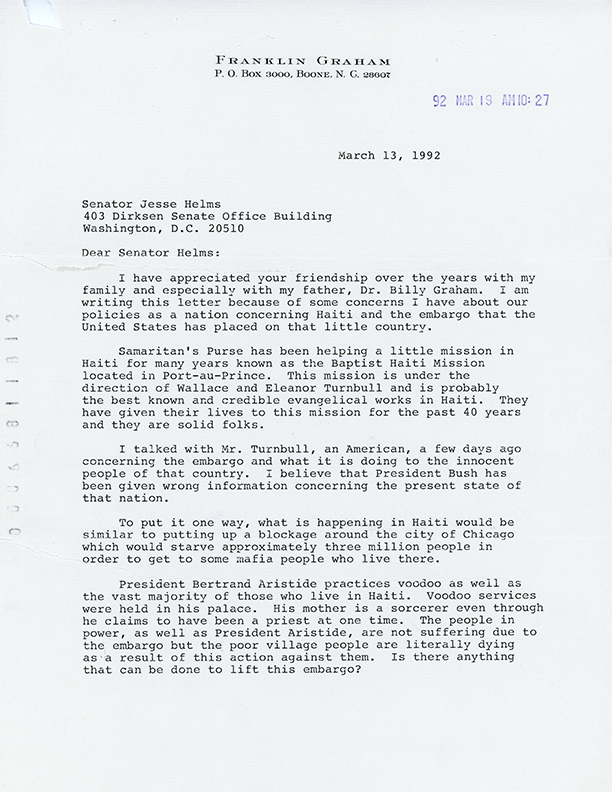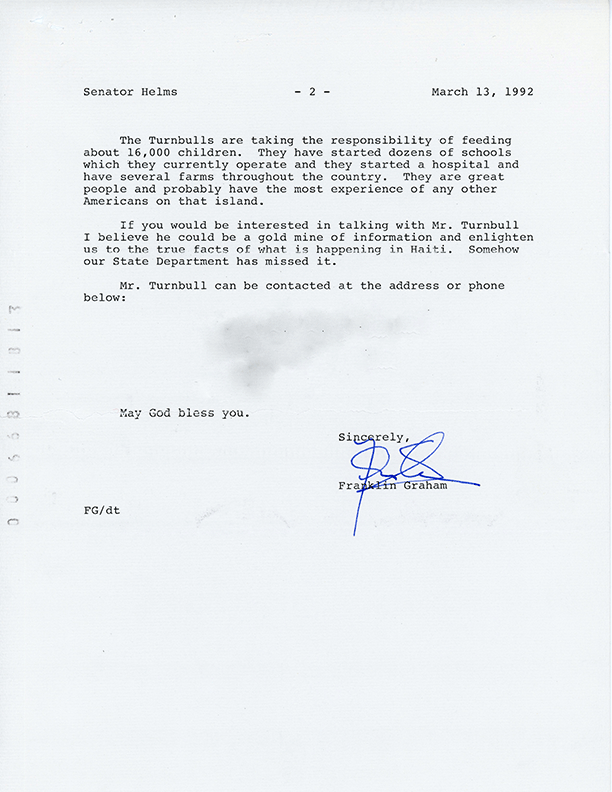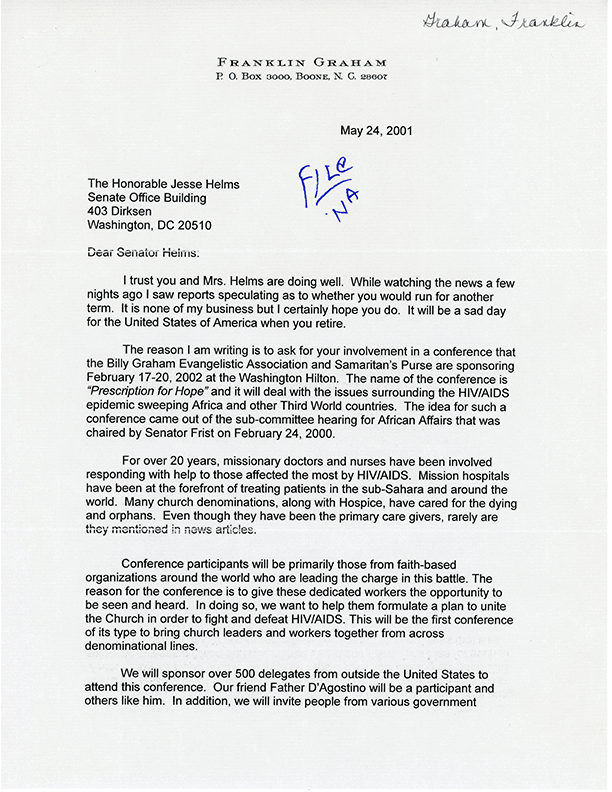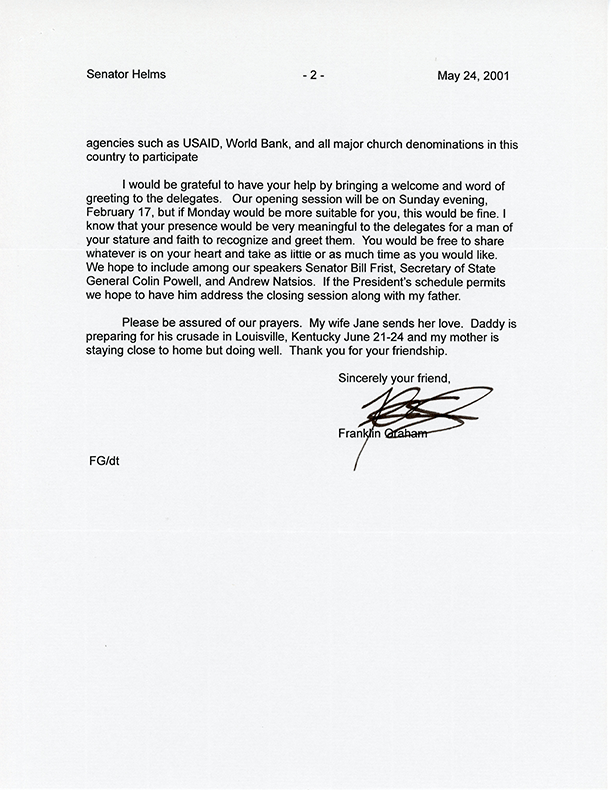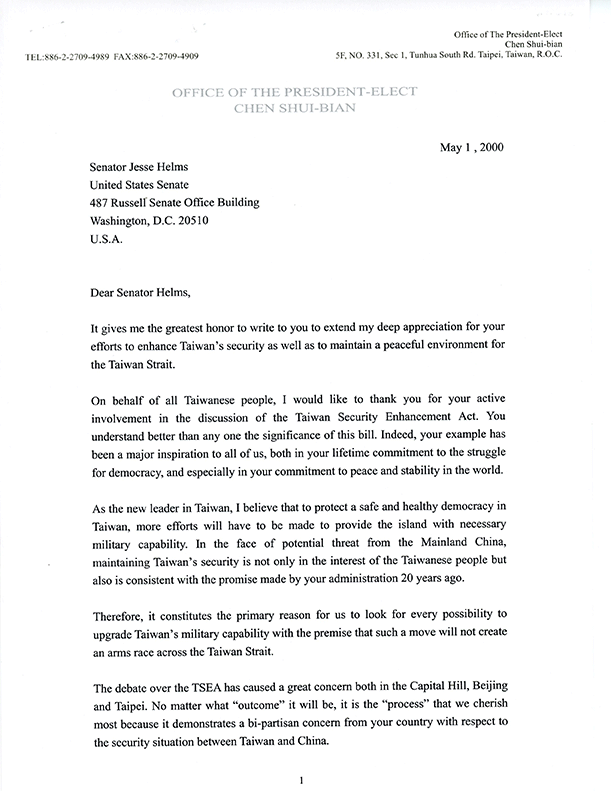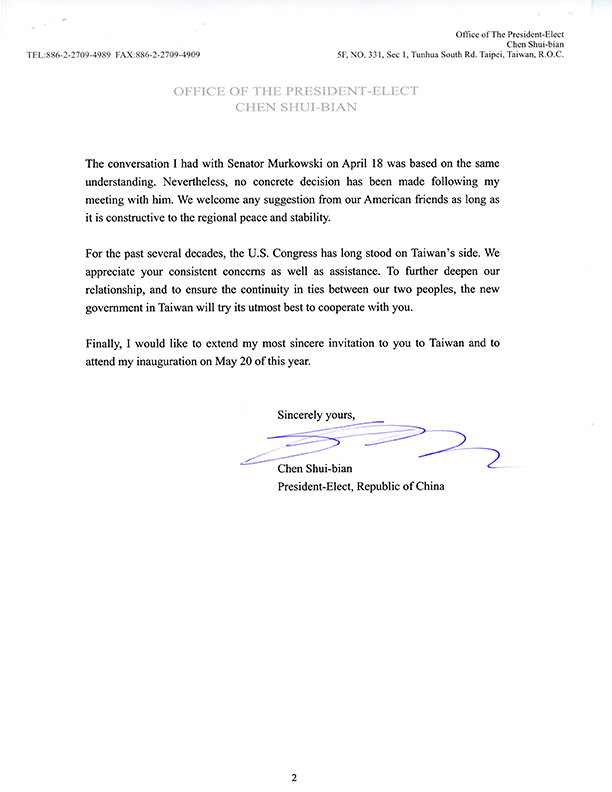Jesse Helms: Compassionate Conservative Foreign Policy
Typically, people don’t associate the word compassionate with conservative and certainly wouldn’t label “Senator No” as having a bleeding heart. However, if you look closely at the way Senator Helms dealt with foreign policy it’s easy to see that he cared about people around the world. In fact, as Chairman of the Senate Foreign Relations Committee (SFRC), Helms actively sought a compassionate conservative foreign policy
On January 11, 2001, Helms addressed the American Enterprise Institute on how conservatives could be compassionate with their foreign policy. He also highlights a few of his own accomplishments and discusses the issues on the SFRC agenda. Helms emphasized that compassionate conservatism was at the “top of the Foreign Relations Committee’s agenda.”
“Toward a Compassionate Conservative Foreign Policy”
Excerpts from an Address to the American Enterprise Institute
Washington, D.C., January 11, 2001
For six years, I’ve had the privilege of serving as chairman of the Senate Foreign Relations Committee. And during those six years Senate Republicans have had some important foreign policy accomplishments which I hope we can all be proud of.For example, we enacted into law the Libertad (or Helms-Burton) Act, tightening the noose around the neck of the last dictator in the Western Hemisphere – Fidel Castro.Working with our committee’s ranking member, Joe Biden, we took the first steps toward reforming our nation’s foreign policy institutions for a post-Cold War world.We passed historic, bipartisan legislation – the Helms-Biden law – that pays America’s so-called UN “arrears” only if there are specific, deep-seated reforms at that dysfunctional institution.And we passed the National Missile Defense Act, mandating the deployment of missile defenses as soon as the technology is ready.
Looking toward the future, Senator Helms highlighted what was on the Foreign Relations Committee agenda.
And that is why today my purpose is to share with you some of the vital issues on the Foreign Relations Committee’s agenda as we prepare for a new administration and the start of the new, 107th Congress…Now, it might surprise you to find “compassionate conservatism” at the top of the Foreign Relations Committee’s agenda; allow me to explain why it’s there.
Foreign Aid:
Samaritan’s Purse is led by my longtime friend the Reverend Franklin Graham – the son of a very good friend, Dr. Billy Graham. I believe that Franklin and his folds at Samaritan’s Purse do more good, with less money, for more people around the world than the entire foreign aid bureaucracy combined…But Samaritan’s Purse is far from alone in this humanitarian endeavor. Their work is complemented every day by the equal efforts of groups such as Catholic Relief Services, World Visions, Save the Children, Hadassa, and many other who are changing lives around the world ‘one person at a time.’Too often, however, faith-based charities are dismissed by the U.S. foreign aid bureaucracy. The bureaucrats treat them as if the efforts of these faith-based charities are quaint but unworthy of government support….we will reduce the size of America’s bloated foreign aid bureaucracy – then take the money saved and use every penny of it to empower these ‘armies of compassion’ to help the world’s neediest people.
Democracy Around the World:
While we work to improve the ways America helps those in material need, we must also be attentive to another need – the need for human liberty. Because foreign policy that does not have freedom at its core is neither compassionate no conservative…our challenge in the start of the new millennium – and the start of this new administration – must be to consolidate the democratic advances of the last ten years, while increasing the pressure on those who still refuse to accept the principle that sovereign legitimacy comes from the consent of the governed.
Political Changes in Mexico
A good place to start is our own hemisphere, and specifically just across our own border. In Mexico, after seventy-one years of one-party rule, the corrupt Institutional Revolutionary Party (or PRI) has finally been voted out of office. President Vicente Fox’s victory opens avenues for genuine friendship and cooperation between the United States and Mexico…I will do everything I can to help both presidents set a new course for U.S.-Mexican relations, and I look forward to collaborating with the Bush administration to help set out relationship with the Mexican government on the right course.
Since his first days in office, Senator Helms was a strong supporter of a free and democratic Taiwan. He believed the United States had a responsibility to PUBLICLY support the people of Taiwan and the newly elected President Chen.
Another place where democracy desperately needs renewed American support is in Taiwan. A remarkable thing happened in Taiwan at the close of the twentieth century. With the election of President Chen last year, the people of Taiwan presided over the first peaceful transfer of power from a ruling party to its democratic opposition in five thousand years of Chinese History.This was an incredible achievement – and an ultimate repudiation of the myth spread by Beijing’s dictators and their allies that Western democracy is incompatible with so-called “Asian values.”
After the Cold War, Senator Helms did not want to abandon the people of the former Soviet Union.
Perhaps the greatest moral challenge we face at the dawn of the new century is to right the wrongs perpetrated in the last century at Yalta, when the West abandoned the nations of Central and Eastern Europe to Stalin and a life of servitude behind the Iron Curtain.We began the process of righting the wrong in 1998, when the Senate voted to admit Poland, Hungary, and the Czech Republic in the NATO alliance. I consider it one of my proudest moments as chairman of the Senate Foreign Relations Committee to have helped usher in those three nations’ admission to NATO and thus to have helped them secure their rightful place in the community of Western democracies…vital not only for their security but for ours as well. If we want good relations with Russia, we must show Russia’s leaders an open path to good relations, while at the same time closing off their avenues to destructive behavior.
American Sovereignty and the International Criminal Court:
When the Rome Statute was signed and created the International Criminal Court (ICC), Senator Helms was outraged. He thought it violated the sovereignty of the United States and wanted no part of it. In order to protect Americans from prosecution by the ICC, Senator Helms introduced the American Servicemembers’ Protection Act.
The brazen assault on the sovereignty of the American people is without precedent in the annals of international treaty law…This legislation, which Senator Warren and I introduced last year along with a number of House and Senate colleagues, is designed to protect U.S. citizens from the jurisdiction of the International Criminal Court…Why is this legislation important? Because by signing this flawed treaty…effectively endorsed the ICC’s fraudulent claim of jurisdiction over Americans. We must take action to make clear that, unless and until the United States ratifies the Rome treaty, we reject any claim of jurisdiction by the ICC over American citizens. Period.
Helms closed his “Compassionate Conservative” speech with these words:
As you can see, the Foreign Relations Committee will have a full agenda in the coming year. From revolutionizing the way America delivers foreign assistance; to consolidating the last century’s democratic advances and continue the march for freedom in the next; to preserving, protecting, and defending the security and sovereignty of the United States – we will have our work cut out for us as we seek to restore a foreign policy that is both compassionate and conservative.
View entire “Compassionate Conservative” speech by clicking here or at the American Enterprise Institute website.


